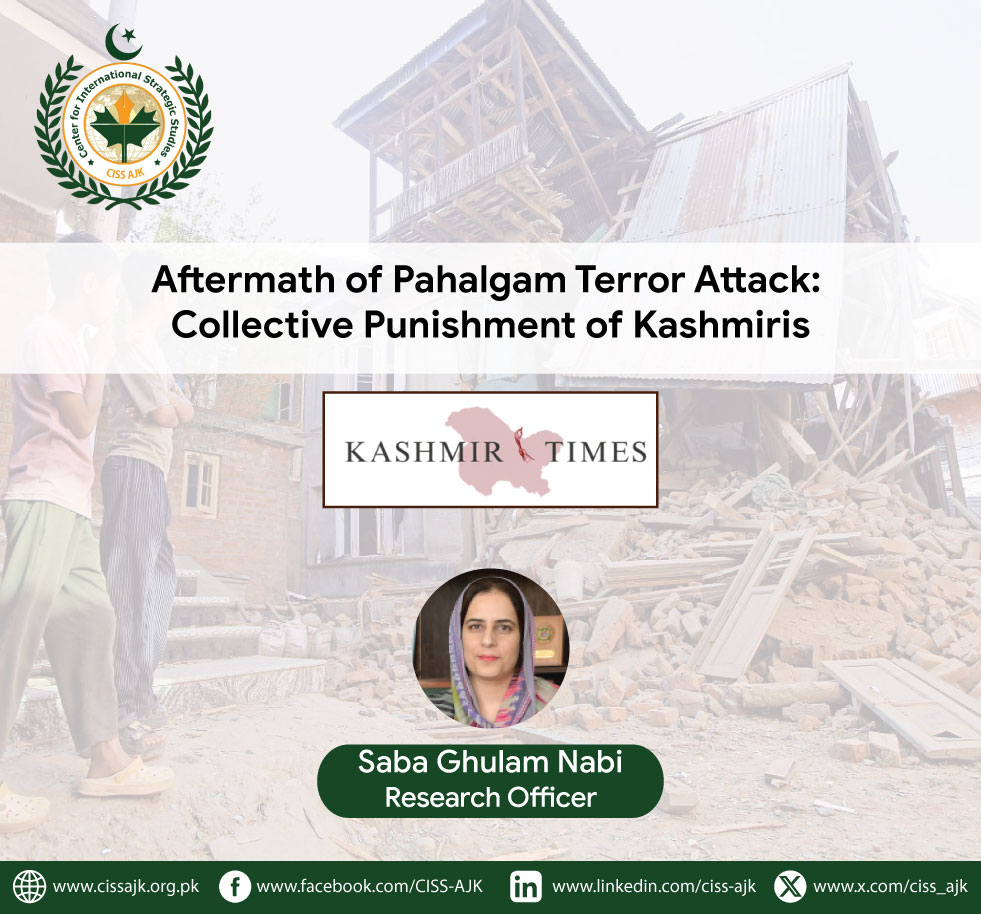Media disinformation, state-sponsored crackdowns, and bulldozer politics compound the suffering of Kashmiris in the wake of a deadly attack.
The recent terror attack on tourists in Kashmir’s Pahalgam mountains has once again fuelled tensions between India and Pakistan. While the government lost no time to point fingers across the borders, even before a formal investigation, mainstream media lapped up and began circulating unverified claims, including doctored audio and fabricated videos.
This deliberate framing of the narrative was clearly designed to influence international opinion, undermine Kashmiriyat — the region’s composite cultural ethos — and discredit the legitimate demand of Kashmiri people.
The Pahalgam attack raises serious concerns over a massive security failure in one of the world’s most heavily militarised zones. Local residents and journalists alike are questioning how such an incident could occur in an area saturated with security infrastructure, including over 10 army checkpoints.
The Central Reserve Police Force (CRPF) camp lies just seven kilometres from the site of the attack, while the Rashtriya Rifles (RR) camp is a mere five kilometres away. How did heavily armed attackers infiltrate such a high-security zone undetected?
Rather than address these pressing concerns, the government has fostered an atmosphere in which critical voices are suppressed. Those questioning the official version of events are being silenced, further eroding the space for democratic discourse.
The aftermath of the incident has intensified the already precarious situation for Kashmiris living under prolonged Indian control. A sweeping crackdown has followed, marked by arbitrary detentions, intrusive raids, intimidation, and the demolition of civilian homes.
What is unfolding appears to be collective punishment: an unprovoked campaign of violence unleashed on an entire population.
In the days following the incident, Kashmiri Muslim students were assaulted in cities like Chandigarh and elsewhere across India. Many were threatened and forced to vacate their hostels and rented accommodation.
Muslim businessmen received threats demanding they shut down their shops. Mobs aligned with Hindutva ideology have staged protests targeting Kashmiri-owned properties, vandalising homes and businesses both within Kashmir and in other parts of India.
The Pahalgam incident has also exposed the fallacy behind the Modi government’s narrative of “normalcy” in Kashmir post the abrogation of Article 370. While communal violence against Muslims has been an ongoing phenomenon in India, this event has acted as an accelerant — largely due to the fake news propagated by media outlets.
Indian media also tried to claim that Kashmiris did not assist the victims. Yet, multiple eyewitness accounts and survivor testimonies confirm it was local Kashmiris who extended help — offering food, shelter, and transportation.
In fact, one Kashmiri man lost his life trying to save tourists. These facts are a testament to the enduring spirit of Kashmiriyat — a tradition of hospitality and humanity — even in the face of adversity. Following the attack, Kashmiris held protests and observed shutdowns, calling for justice and expressing solidarity with the victims.
Nonetheless, instead of acknowledging the region’s grief and resilience, the Indian state has chosen to punish it further. The BJP government has resumed its so-called “bulldozer politics”, demolishing the homes of Kashmiris allegedly linked to the attack — without trial or investigation. While in UP and other states, bulldozers are summoned to demolish houses of the suspects, in Kashmir, IEDs were used to blast houses.
Entire neighbourhoods have been affected, including adjacent properties with no connection to the incident. Towns such as Pulwama, Kupwara, Shopian, and Anantnag have seen a fresh wave of punitive demolitions.
Tourism is the economic lifeline of Kashmir, and the Pahalgam attack occurred at the beginning of the tourist season. Many believe the timing was not coincidental. By creating a climate of fear, the attack has deterred visitors and delivered a direct blow to the livelihoods of countless Kashmiris who depend on tourism.
The suffering has not ended there. Dozens of women from Pakistan-administered Kashmir (PAK) who married residents of the Indian part of Kashmir have lived there for decades.
Now, in a starkly discriminatory move, they are being deported to Pakistan — forced to leave behind their children and families solely because of their origins. These forced separations are tearing families apart and inflicting untold emotional trauma.
Meanwhile, hate speech against Muslims has surged to alarming levels in India. Elected MPs and public figures are openly chanting inflammatory slogans, calling for Israel-style retribution and advocating violent revenge — with particular venom directed at Kashmiris.
Such rhetoric, aired on national media platforms, signals a dangerous escalation in communal hostilities in a region that is already a nuclear flashpoint.
All the people with their hearts in the right place can not afford to remain bystanders. There is a need for a thorough investigation of the Pahalgam incident under independent supervision.
It is critical to hold those accountable who are levelling baseless accusations and are criminalising Kashmiri people and their political demands. The Kashmiris have paid a heavy price over the decades in pursuit of their rights. It is high time the world steps in — not to stoke further conflict between two nuclear-armed states — but to ensure that justice is served.
(*The author is a Research Officer at the Centre for International Strategic Studies, Muzaffarabad.)



